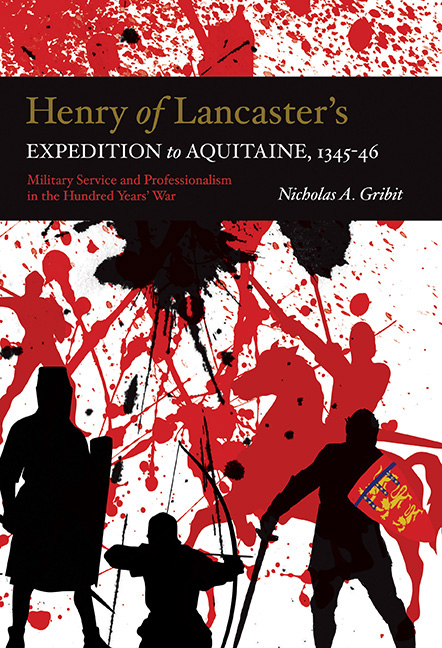 Henry of Lancaster's Expedition to Aquitaine, 1345-1346
Henry of Lancaster's Expedition to Aquitaine, 1345-1346 Book contents
- Frontmatter
- Dedication
- Contents
- List of Illustrations
- Preface and Acknowledgements
- Abbreviations
- Note on Money and Names
- Introduction
- Part I Henry of Lancaster and the English Army: Soldiers, Payment and Recruitment
- Part II The English Expedition to Aquitaine, 1345–46
- Part III Military Service and the Earl's Retinue for War
- Conclusion
- Appendix A Transcription and Translation of Lancaster's Indenture
- Appendix B Prosopographical Catalogue of Men in Lancaster's War Retinue, 1345–46
- Bibliography
- Index
- Warfare in History
- Frontmatter
- Dedication
- Contents
- List of Illustrations
- Preface and Acknowledgements
- Abbreviations
- Note on Money and Names
- Introduction
- Part I Henry of Lancaster and the English Army: Soldiers, Payment and Recruitment
- Part II The English Expedition to Aquitaine, 1345–46
- Part III Military Service and the Earl's Retinue for War
- Conclusion
- Appendix A Transcription and Translation of Lancaster's Indenture
- Appendix B Prosopographical Catalogue of Men in Lancaster's War Retinue, 1345–46
- Bibliography
- Index
- Warfare in History
Summary
In the summer of 1345 Henry of Lancaster, earl of Derby, led an English royal army to the duchy of Aquitaine in south-west France. The expedition was a remarkable achievement for the English and marked the first successful land campaign of the Anglo-French conflict which has come to be known as the Hundred Years' War (1337–1453). More importantly, the enterprise signified the beginning of a string of military victories for the English in different theatres of war from 1345 to 1347. In 1345 the earl led an outnumbered force to two major victories during the early stages of the expedition, first at the town of Bergerac and then at the battle of Auberoche; these events were the prelude to Edward III's great voyage to Normandy the following year which culminated in his decisive defeat of the French at the battle of Crécy and the subsequent capture of Calais (1347). The success of the expedition in Aquitaine set the tone for the highly effective multi-front warfare launched by Edward III in the mid 1340s, resulting in victories over the Scots at Neville's Cross (1346) and over the French at La Roche-Derrien (1347), and the subsequent capture of the French king, Jean II, at the battle of Poitiers in 1356 which ultimately compelled the French to accept the ignominious Treaty of Brétigny-Calais in 1360.
It is, indeed, probably the shortness of the period between Lancaster's success in the duchy and Edward III's victory at Crécy which has caused historians to overlook the true significance of what has, in many ways, become a ‘forgotten war’. It not only delivered the first blow to the flower of French chivalry, but also provided a vital psychological boost to English armies that were fighting, or were preparing to fight, in other theatres of war. It helped legitimise Edward III's dynastic claim to the French throne, provided an impetus to military recruitment at home and, ultimately, divided the French forces which itself helped pave the way for Edward's decisive victory against the French king, Philippe VI. ‘The way of Normandy’ (viage de Normandie), as it was known at that time, therefore, has largely diminished the importance of the events which had unfolded in Aquitaine the previous year.
- Type
- Chapter
- Information
- Henry of Lancaster's Expedition to Aquitaine, 1345-1346Military Service and Professionalism in the Hundred Years War, pp. 1 - 6Publisher: Boydell & BrewerPrint publication year: 2016
